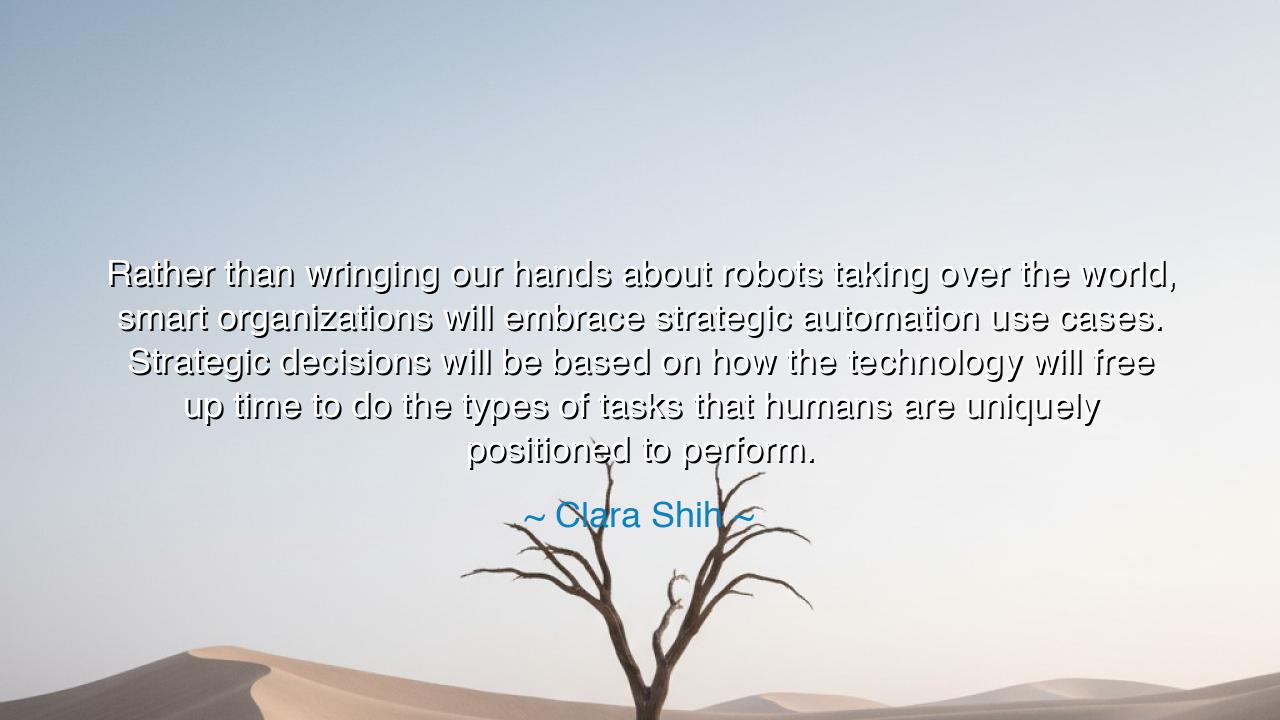
Rather than wringing our hands about robots taking over the
Rather than wringing our hands about robots taking over the world, smart organizations will embrace strategic automation use cases. Strategic decisions will be based on how the technology will free up time to do the types of tasks that humans are uniquely positioned to perform.






Hear the wisdom of Clara Shih: “Rather than wringing our hands about robots taking over the world, smart organizations will embrace strategic automation use cases. Strategic decisions will be based on how the technology will free up time to do the types of tasks that humans are uniquely positioned to perform.” These words are not a cry of fear, but a call to courage. They remind us that the future is not to be dreaded but to be shaped—that robots and automation are not monsters, but instruments, and it is the wisdom of humans that will decide how they serve.
For many tremble at the mention of technology, as if it were a wild beast breaking free from its cage. They imagine a world where machines dominate, where labor is stripped from men and women, and where the human spirit is diminished. But Clara Shih’s words pierce through this fear with clarity. She teaches that the true power lies not in the machines themselves, but in how we choose to use them. The wise will see that automation is not an enemy of humanity, but a partner that can bear our burdens and leave us free for higher pursuits.
History gives us countless examples of this truth. When the printing press was first forged, many feared it would destroy the art of storytelling and corrupt the human voice. But what came of it? The spread of knowledge, the rise of literacy, the flowering of thought across continents. The machine did not destroy the human spirit; it liberated it, allowing men and women to write, to learn, to dream on scales never before imagined. So too with automation: if guided wisely, it will not replace us, but release us into the tasks only we can perform—compassion, creativity, vision, and moral choice.
The ancients knew that true strength lies in assigning each to their proper role. The farmer worked the land, the soldier bore the sword, the philosopher sought truth. In the same way, Shih calls us to discern between what machines do best and what only humans can bring forth. Let the machines carry out the repetitive, the heavy, the mechanical. Let the human heart attend to the delicate, the relational, the imaginative. Thus balance is restored, and both man and machine serve a higher order.
Consider the tale of the Industrial Revolution. In its early days, fear swept across Europe. The Luddites smashed machines, terrified they would be made useless. Yet over time, though jobs changed, new vocations emerged, new industries were born, and humanity learned to harness the strength of the steam engine and the factory. The lesson repeats itself now in the digital age: resist not with fear, but respond with wisdom. The future belongs not to those who break the machines, but to those who bend them to noble purposes.
Shih’s words also remind us of responsibility. For strategic automation is not mere adoption of new tools, but thoughtful decision-making: asking what tasks can be surrendered to machines, and which must be guarded as sacredly human. If we allow machines to replace empathy, justice, or creativity, we will lose ourselves. But if we free ourselves from drudgery in order to devote more time to healing, teaching, inventing, and building communities, then we have not surrendered to technology—we have mastered it.
The lesson for us all is clear: do not fear the rise of robots, but fear the absence of wisdom. Be deliberate in how you wield technology. Ask yourself always: does this tool free me to be more fully human, or does it make me less? Seek opportunities to let machines handle what is repetitive, while you devote yourself to what is eternal—the tasks of the heart, the imagination, and the soul.
Thus, let Clara Shih’s words be remembered as a guidepost for the generations: the age of automation is not the end of humanity, but the beginning of a new chapter. The organizations and individuals who thrive will not be those who shrink in fear, but those who embrace the future with wisdom, patience, and vision. For machines may multiply our strength, but only we can decide to use that strength for justice, for creativity, and for the flourishing of all.






AAdministratorAdministrator
Welcome, honored guests. Please leave a comment, we will respond soon